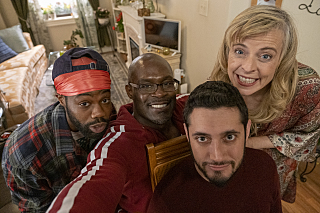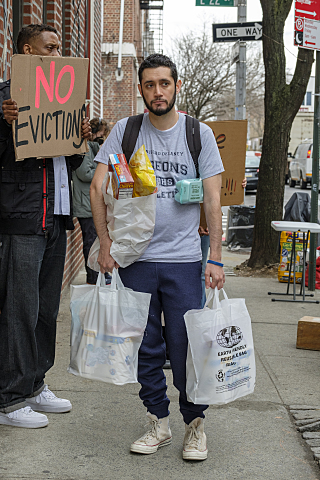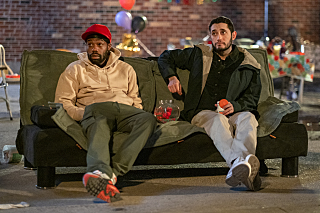Described as a “raw comedy” or “grounded comedy,” the Showtime series Flatbush Misdemeanors follows the trials and tribulations of Dan Perlman and Kevin Iso, two characters struggling to thrive in Flatbush, Brooklyn. “We didn’t want the jokes to feel stock. We wanted them to come through the characters,” said co-creator Dan Perlman.
Perlman notes that many sitcoms feature interchangeable jokes, where it doesn’t matter who says them, as opposed to jokes associated with the character who is speaking. “We just wanted to make a grounded show that feels a little different, and isn’t just joke, joke, joke every three seconds,” he said. Some of the jokes are so subtle the audience might miss them. This was all part of the process of making the show feel more true to life.
“If there’s deadpan comedy, it’s not intentional. That’s just sort of the style we developed. We are more laid back. Then you balance that out with people who have different energies.” The show, which started as a low budget web-series, was originally self-produced. “We could shoot in a bakery for an hour, then they would kick us out. Then a real customer would come in and we would pause filming.” It was guerrilla-style filmmaking.
He continued, “So it was cool to be able to evolve it into a real TV show, with a professional set and crew. But, we wanted to keep a lot of the cast [from the web series], because these were comics and we wanted to continue to work with them.”
The Characters Behind The Show
“We didn’t want Flatbush to be the Dan and Kevin show, because we didn’t want it to be a show where we run a shop together, a crazy person comes in and we deal with them. We wanted it to be a community where there are a lot of different people. That feels like New York to me.”
In this regard, Flatbush is sort of its own character in addition to the locale of the show. “Kevin and Dan have to coexist while doing their own thing. Through those run-ins and accidental conflicts. That’s the trick and the balance of it. Everybody has their own wants and needs, so you see and explore all these characters. Our characters are only the entry point.”
In addition to the character development, Perlman’s style has also been shaped by by his background in stand-up and improv. “I love stand-up. When you start, you have a joke that works… but over time, you figure out what you like to talk about.” That conversational style translated into the TV series.

Kevin (Kevin Iso), Kareem (Kareem Green), Dan (Dan Perlman and Maria (Maria Bamford) Photo by Francisco Roman/ SHOWTIME.
As Perlman’s ideas evolved, he said he would focus on a micro idea, then zoom out to see other perspectives on that idea. “That’s a good way to flesh it out a bit. Find a small anecdote you might tell a friend, make it full, and hit other points of view.”
For these bits on the show, the idea is often to have two opposing perspectives around an idea, rather than pre-judging it, so everyone simply agrees with one another in the end (Comedian Rami Youseff would likely agree with this sentiment).
“If you decide this character is right or that character is right, that tampers with the process. If you can flesh out characters, you also have a good sense or rhythm of when to add a joke because the audience needs that tension release.”
Imperfect Friendship
Overall, the show feels like the dialogue is a mixture of scripted and improv, but Perlman claimed “it’s more scripted than you would think.” He added, “The natural and organic feel comes from the cast, which we established in the web series because every adult was a stand-up. Stand-ups and comedians, if you make them comfortable, they will make the line better.”
“They know how to deliver the lines, stay within their personas, and hit the notes. That way, it doesn’t feel overly-written. We really lucked out with the cast, because the non-standups are also able to stay within themselves, and hit the jokes with a natural feel.”
Underneath the dialogue, the show is really a show about two friends. “One thing I think is different about the show, these two guys have been friends a long time. It’s complimentary, but it’s imperfect also. When they do verbalize stuff, they’re not good at it. That’s definitely a thing in male friendships. There’s a tension or difficulty to communicate, but a comfort to call each other out. That only comes from knowing somebody for a long time. That imperfection in friendship makes it more interesting.”
The heightened versions of Dan and Kevin (“more aimless and wandering”) are similar yet different to the writers and to one another. “The Dan character tries to help a lot, in a lot of different situations, but he doesn’t really have the tools to be helpful. He tries to help in the school, but he can’t. I love and hate those teacher-savior movies.”
Perlman jokes about an example where movies will have nineteen teachers come in, but no one can teach these kids to read. “Then, Matthew Perry comes in, teaches them hop-scotch, and now they know Pre-Cal. I see my character as one of those teachers who failed. But I think he is empathetic and he takes on other people’s problems because it gives him a purpose, while he’s trying to figure it out.”
Kevin is on another journey although he’s trying to figure it out. “Kevin is trying to find his sense of place. He has a tougher time asking for help. I think that’s a teenage to mid-20s mindset. You don’t want help from other people. You want to make it yourself. You need other people, but don’t want to admit that. In his art, he’s gaining this sense of self. He has the technical skills, but is figuring out his own voice and what speaks to him.”
In some ways, the characters rotate between “victim” and “rescuer.” Perlman said, “They’re beaten down, but it’s tough to say they’re victims. Maybe it’s because I don’t feel bad for them. They are just treading water.”
Avoiding Tropes
When writing the show, Perlman said they were aware of “drifting plot lines.” He said, “So like in the third episode, we have a neighbor who might get evicted. Kevin’s ‘not-quite-girlfriend’ organizes a protest to help. At some point, my character is called a gentrifier.”

Dan Perlman. Photo by Francisco Roman/ SHOWTIME.
“There’s a [sitcom] world where my character will prove he’s not bad and become a good character, but that was less interesting than the reality of it. She says this thing, has a point, but you have to go about your day. She’s not wrong, but he’s got to go to work. It feels more real than our guys trying to win everyone over.”
The chapter format of the show is also noteworthy. “This came out of the web series. The lack of resources made us do the parentheticals and subtitles and the chapter divides. I think they give the audience a reset, and allow a shift in perspective.”
Specifically, the web series didn’t have establishing shots or other “reloads” for the show. “It’s just another way to make it feel different and give us a hard cut out of the scene that feels different. It gives us some freedom. We also play around with the chapters.”
Logistics aside, the stories are also foundational. “One big way we propel the story, is that it’s not just Dan and Kevin. We lay out these characters we can get deeper with. You have all these characters where you can weave them in, crisscross, and pair up to expand them, and see something different about them. We’re fortunate to have so many different characters and build them out. They’re at different stages, so we can hit different notes.”
In terms of writing advice, Perlman admits to being hard on himself, but said, “You have to be willing to have that first draft, second draft, third draft that might miss the mark. Maybe they’re circling the idea, but not hitting it. That persistence, which is the same as working out a bit, you have to scratch and crawl, be willing for it to be bad, then allow it to work, know what’s missing, and find the structure. Allow it to take the time that it needs to take.”

